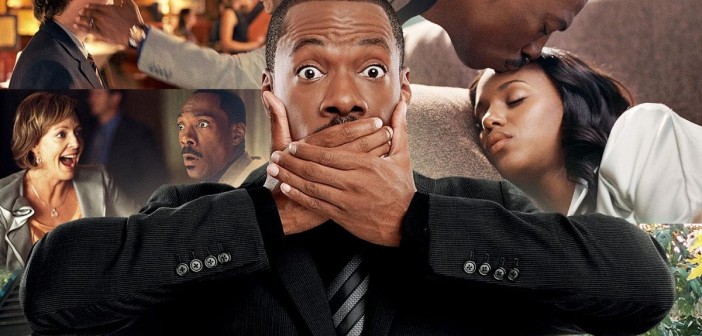Don’t Speak!
A Thousand Words is a film that strains mightily to be both funny and heartfelt but never manages to be either. And yet, like an underachieving high school student, I could see the potential. I just know that buried somewhere within this narrative catastrophe is a rich, complex fable with the power to register emotionally. The points are all there; what’s missing is an appropriate, plausible way to make them. This could explain why the film was shelved after principal photography wrapped in 2008. The official reason for the delayed release is that it got lost in the shuffle when DreamWorks separated from Paramount and Viacom. While I have no doubt that this was a contributing factor, I can’t help but feel that the film itself created a whole host of problems, ones the producers were worried couldn’t be fixed. If this is the case, then it turns out they were right.
It tells the story of Jack McCall (Eddie Murphy), a Los Angeles literary agent. He’s mean-spirited, demanding, and manipulative, and he talks nonstop at a hundred miles an hour. He’s also a workaholic, although he makes it a point to not read the manuscripts he’s sent. In fact, he has devised a system of reading only the first five pages and the last five pages; if the first five establish reliable characters and marketable plot point, and if the last five resolve everything, it’s automatically a bestseller. All he really lives for is dressing sharply and making deals with other literary houses. He never listens to his wife, Caroline (Kerry Washington), who feels they should move away from their Hollywood Hills home into a more family friendly suburb for the sake of their infant son.
Currently, he’s looking to rope in a New Age guru named Dr. Sinja (Cliff Curtis), a Deepok Chopra parody who claims to have written a book but has thus far been unwilling to sell it. Jack goes to Sinja’s ashram to work his magic, which involves underhanded tactics like saying he actually read the book. Somehow, Jack cuts his hand on the trunk of a Bodhi tree, which then magically transports itself into his backyard. It’s then determined that whatever happens to the tree will happen to Jack. Example: If it gets sprayed with water, Jack will break into a sweat, and if a pair of squirrels scurry up the trunk, it will tickle Jack’s body. And then there’s the matter of the leaves; every word Jack speaks or writes down results in the loss of one leaf. Sinja warns him that trees die whenever they lose all their leaves. Jack quickly learns that he must choose his words carefully – or not say anything at all.
This provides the setup for a number of situations that could have been funny had they not been so forced. There are several scenes with Jack’s tightly-wound assistant (Clark Duke), who at one point has to close a deal on Jack’s behalf at a lunch meeting; he takes the strategy of doing what Jack would do far too literally, talking like a black stereotype and making crude physical gestures. There are also several scenes with a Starbucks employee, who must interpret Jack’s exaggerated miming to fill his order. And then there’s a cameo by comedian John Witherspoon as a blind man who steps into an intersection even though it’s not his turn to walk yet. The oddest scene is when he sits in his therapist’s office; the therapist is so used to not getting a word in edgewise that he finds he has nothing to say. So they both just sit there making comical expressions. Never mind the fact that it’s never explained why Jack is in therapy at all.
And just like that, the film transitions from a manufactured slapstick comedy to a soppy drama. We meet Jack’s mother (Ruby Dee), who always mistakes her son for her late husband, the same man who left his family when Jack was only a boy. It seems that Jack has been holding on to a lot of anger over the years. How the filmmakers believed such overtly dramatic material like dementia and abandonment issues could work in a comedy, I have no idea. And then there’s Jack’s marriage, which had been falling apart for quite some time. It has only gotten worse since Jack was forced to stop speaking. All leads to a sappy, tearjerker ending that combines personal awakening with spiritual awareness. Too bad it comes too late in the story for us to care one way or the other.
But that’s the thing: We could have cared. I believe that if this story had been completely reworked as a dramatic parable, its lessons of letting go of the past and being open and attentive to your loved ones would have registered. As it is, they come off as greeting-card sentiments transplanted from an entirely different movie. Did the reshoots in 2011, a full three years after principal photography ended, contribute to this? Perhaps someone saw a rough cut of A Thousand Words and thought it was too silly for its own good. If that’s the case, I’m afraid more harm was done that good. This movie is an absolute mess. Perhaps it would have been a better idea to keep this film on the shelf and let it disintegrate into nothing but scraps of celluloid.

